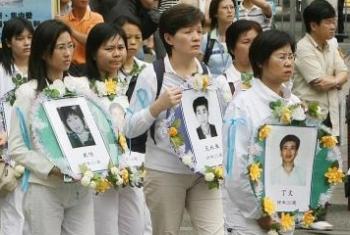And justifiably so. An agreement in 1989 set forth that with all things Olympic, mainland China would use the term “Chinese Taipei”, which The Republic of China (Taiwan) prefers.
While not apparent in English, there is a big difference between these two phrases in Chinese. The term “Taipei, China” or zhongguo taibei, carries the meaning that Taiwan is, or should rightfully be, part of the land internationally recognised as China (zhongguo). The Communist Party is the recognised government of that land, so the name implies that Taiwan is ruled by the Communist Party.
However this is not the case. Taiwan has a different government, a different army, a different system overall. Nor is the Chinese Embassy able to provide a visa to Taiwan, and one has to go to Taiwan’s de-facto embassy, the Taipei Economic and Cultural Office, to obtain one. It’s an absurd contortion of reality for the Communist Party to claim it owns Taiwan, when it has never in history owned Taiwan.
However “Chinese Taipei,” or zhonghua taibei, contains no such implication. Zhonghua means “Chinese”, as in ethnically Chinese. It is a term often used when referring to the diaspora of Chinese people around the world, including those who have never been to mainland China. It defines the Chinese people culturally, in a way that transcends political borders.
Most Taiwanese people agree that they are hua ren, or culturally Chinese. They eat with chopsticks, speak Chinese languages, write Chinese characters, believe in Chinese Buddhism or Daoism, learn Tang Dynasty poems in school and have some understanding of traditional Chinese philosophy. While there are differences to be resolved, the concept of hua ren unifies the two sides of the Taiwan Strait in a deeper cultural sense.
That’s not beneficial to the Communist Party for two reasons. Firstly, the Party is a dictatorship that never plans to leave. The cadres want the Chinese people to see China and the Communist Party as inextricably linked. They want to keep far from people’s minds the notion that governments can come and go, as dynasties have come and gone, while a land and its people remain.
Secondly, a sense of brotherhood on both sides of the Strait might strengthen the desire of mainland Chinese to have the system that Taiwanese have. This is something the Communist Party is desperate to prevent. The transparency that comes with democracy would bring all kinds of skeletons out of the closet, and a lot of high-ranking Communist officials would be put on trial for corruption and crimes against humanity. Taiwan’s former President Chen Shui-bian is currently battling corruption charges, something inconceivable under the Communist system.
The Party has used a strategy of fanning nationalism and glazing people’s eyes with anger at Taiwan’s “betrayal” in “seeking independence”, which has been effective so far in keeping those feelings at bay.
Taiwan was once, and according to its own name still is, a part of China. Here lies the distinction between the Taiwanese people’s definition of ‘China’ and the Communist Party’s. Today, Taiwan accepts that China, as a concept beyond political boundaries, is presently ruled by different governments. That’s nothing new, as history has more than once seen China divided into different states.
However, the Chinese Communist Party to this day clutches onto an archaic sense of entitlement over ‘China’, and its people. The state-controlled Chinese language media continue to hammer home the zhongguo taibei concept, pushing the Communist Party’s agenda at the expense of the unity of hua ren around the world.
In doing this, the Communist Party bears its ugly face for all to see. To be Chinese, say the cadres, your first allegiance must be to the Communist Party.
With additional research by Ben Bendig



